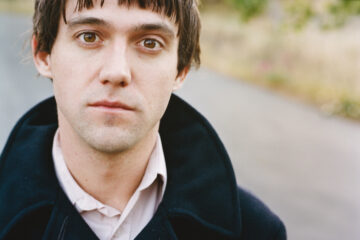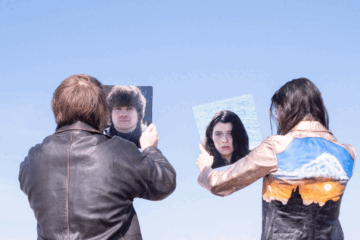Conor Oberst was in the studio with his band Desaparecidos when the 20th century came to an end in the USA on September 11. The group’s debut album »Read Music/Speak Spanish« was a raging, furious dissection of US ideology and its consequences. In the chaos following the attack on the World Trade Center, it was shelved for a while due to somehow being too contemporary, putting its finger too deeply into the fresh wound. Two months later, however, Oberst went back into the studio to revive his Bright Eyes project with Mike Mogis and a revolving carousel of guest musicians from the Nebraska scene. »Lifted or The Story Is in the Soil, Keep Your Ear to the Ground« was released in August 2002 and was to mark their final breakthrough as a band because it did not put external circumstances to the test, but explored by speaking of the inner life of Oberst’s generation.
When »Lifted« was released, Oberst was 22 years old and had already been in the business for ten years, having played in about a dozen bands. He had founded Bright Eyes as a teenager in the basement of his parents’ house and constantly expanded the band’s personnel and instrumentation for his recordings, incorporating electronic elements and even quotes from classical music into his music. At the centre, however, was an approach to folk music that was indebted to Bob Dylan as much as it combined the sensitivity of Nick Drake and the down-to-earth rawness of Neil Young with the eccentricity of Daniel Johnston. Bitter and cold like The Cure in their darkest moments, at times explosive like the grunge generation, desolate like many other bands on the roster of his Saddle Creek label or self-indulgent like the third wave of emo bands with whose representatives Oberst shared the stage as part of Desaparecidos, it also built bridges to various moody strains of 1980s and 90s rock music.
An abysmal and broken person, a pretty swell dude
Oberst satirised this himself, but the stigma of the sniveller stuck to him—which in turn worked to his career’s advantage. The skinny guy with the dishevelled hair had charisma and struck a chord with the times because he represented a new type of rock star based on a more complex image of masculinity than that of the grunge generation: Hyper-intimate and yet completely permeable, self-reflective and self-destructive, eloquent and vulgar, desperate and pissed off, self-taught and a jack-of-all-trades, a brooding genius and tireless team player. An abysmal and broken person, a pretty swell dude. The kind of person who said »I« often in his songs but did not necessarily talk about himself, which is why he gave many the feeling that he spoke for them. Who had understood that the problem was not that no one wanted to believe any more, but that instead everyone wondered why they should believe in anything at all.
Oberst was, in short, the ideal identification figure for a western, suburban generation for whom the post-pubescent hangover set in after the end of the 1990s. On »Sunrise, Sunset« from his 2000 album »Fevers and Mirrors,« he asked what was on everyone’s mind: »You’re manic or you’re depressed / Will you ever feel okay?«
After the Apocalypse
Almost a year after 9/11, »Lifted« did not answer such broad questions about the meaning and purpose of life. Instead, however, it gave its audience the feeling that they needed to be asked even more urgently than before. »The picture’s far too big to look at, kid / Your eyes won’t open wide enough / And you’re constantly surrounded / By the swirling stream of what is and what was,« are the first lines sung by Oberst, easily the most concise paraphrase of the CNN and DSL generation’s experience of the world at that time. But »The Big Picture« is first and foremost a reckoning with their parents’ generation, which had robbed them of their perspectives. After all, the word »lifted« in the album title, which also appears in the last line of the track that so abruptly ends after almost nine minutes, can be interpreted as »stolen,« depending on the context. At the same time however, the term also derives from Christian literature, the biblical promise of the rapture—the process of being »lifted« into the kingdom of heaven.
These themes are reflected in the musical structure of those pieces, between three and a half and ten minutes long, which turn in circles like classic folk songs and yet somehow move forward thanks to Oberst’s lyrics. This coexistence of crushing stasis and uplifting hope is effective above all because it is brilliantly staged. Oberst had always written simple songs arranged in complex ways, and on »Lifted« reached his creative peak for the first time. Now and then the sound swells as powerfully as in the music of the Constellation bands, who expressed a very similar atmosphere at the same time with different means. Then again it is as simple and naked as the music of Elliott Smith or Songs: Ohia. Variety-like sounds, pub music actually, close to the carnivalesque, found their way into the music of Bright Eyes and in between, nods to country music already hint at Oberst’s musical future. Through clever arrangements and Mogis’ detailed, air-tight production, Oberst and his studio colleagues built mini-operettas that exist on their own and yet only really make sense in combination.
He distances himself from the notion of him as a preacher or prophet, hammers home the point that he is just as clueless as everyone else.
»LIFTED« opens up a field of tension between appearances and the real, the legacies of the past and messianic promises, a panorama after the apocalypse in the double sense of that word: after the end of a world and the revelation that it had been built on sand. In almost every one of the 13 pieces, this zero-hour feeling is being expressed by Oberst mentioning the future—or at least how it seems to be blocked for all those lyrical doppelgängers and characters. The slogan »No Future« is being reformulated as a question: »What Future?« is the unspoken refrain of this album. Salvation is repeatedly referred to in the argot of Christian eschatology and yet being questioned at the same time. »No, I don’t look back because the road is clear / And laid out ahead of me,« it says in one song, and »Working on the record seems pointless now / When the world ends, who’s gonna hear it?« in the very next one. This is also part of a gesture that Oberst repeatedly makes on the album, whether explicitly or implicitly: He distances himself from the notion of him as a preacher or prophet, hammers home the point that he is just as clueless as everyone else. By shifting to the supposedly personal however, the album offers a concise political analysis of the depoliticisation of an entire generation.
Between Appearances and the Real
»LIFTED« ends much as it began, yet entirely different. »Let’s Not Shit Ourselves (To Love and Be Loved)« is an energetic Dylan quote at ten minutes long and thus similar in length to »The Big Picture.« At the beginning, it picks up on the obstructed perspectives on the future that form the album’s leitmotiv: »I’ve seen a child, he’s caught in the sad trap of gravity.« Rapture is nowhere near, no-one’s being lifted up, on the contrary: The narrator lies in hospital after an overdose, having surrendered to appearances, and now has to experience a bitter revelation. But at his bedside is a father who forgives him and loves him, the prodigal son from a lost generation. The—again deeply or at least by default Christian—promise of salvation therein is addressed, but neither denied nor affirmed: »To love and to be loved / Let’s just hope that is enough,« are Oberst’s last lines.
After the apocalypse, a tentative hope for hope arises: perhaps this generation that has no concept of the future could experience rapture after all once it has come to terms with itself and the end of the world. Perhaps it could be lifted above the external conditions that block its view of the way forward. Or at least deep inside regain faith that there is one.










